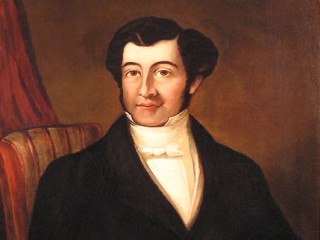
Joseph Bramah biography
Date of birth : 1748-04-13
Date of death : 1814-12-09
Birthplace : Wentworth, Yorkshire, England
Nationality : English
Category : Arhitecture and Engineering
Last modified : 2011-06-09
Credited as : Engineer and inventor, hydraulic press,
0 votes so far
Flushed Out Ideas
Bremmer was an inventive person, always looking for a better way to make things work. While installing toilets for his customers, he realized the existing valve system was unsatisfactory and set about redeveloping the mechanism. In 1778, he patented his own device, improving upon its flushing system. While waiting for approval of the patent, he changed his name from Joe Bremmer to Joseph Bramah, believing it to sound more elegant and professional.
His second noteworthy contribution was the development of the Bramah lock. Specifically designed to foil thieves, Bramah placed one of the locks in the window of his shop and offered a reward of 200 guineas to anyone who could successfully pick the lock. He did not live to see anyone meet his challenge. The lock remained secure for the next 67 years, from 1784 until 1851, when an American mechanic named Alfred Hobbs finally succeeded, after 51 hours of work. The lock was complex. Bramah knew that manufacturing it in large quantities would require the further development of a set of well-designed and precisely engineered machine tools. To accomplish this, he hired Henry Maudslay, a nineteen-year-old blacksmith, as an apprentice. Maudslay proved to be a mechanical genius.
The collaboration of Bramah and Maudslay was extremely successful and resulted in the development of numerous important inventions. In 1794, they developed the slide rest, a crucial improvement to the lathes of the day. The slide rest eliminated the need to hand hold a cutting tool against the metal to be cut. The iron fist of the slide rest now held the tool firmly in place against the metal and provided uniform movement along a carriage, permitting greater accuracy and improved output in metal working.
The following year, Bramah invented the hydraulic press. This device was capable of exerting pressure to several thousand tons, for the purpose of shaping heavy pieces of iron and steel. The press offered the first practical application of hydraulic principles to manufacturers and builders, increasing production capabilities ten-fold. It set the standard for an entire technology. Modern applications of this invention include the car-jack, presses for baling waste paper and metal, and the hydraulic braking system for vehicles. The hydraulic press is considered to be one of the greatest contributions to the industrial revolution.
Other Inventions
Bramah's inventiveness and creativity took many turns throughout his life. He secured a total of 18 patents. Early in his career, Bramah was intrigued by the idea of using water as a means of propulsion. In 1785, he proposed the concept of moving ships by means of screws. His suggestion was the first step toward the replacement of the paddle wheel with propellers for improved and faster movement of ships. Bramah's other inventions included a machine for numbering bank notes, a wood-planing machine, a beer pump, machines for making paper, a machine which made nibs for pens, and a machine to aerate water.
Joseph Bramah died on December 9, 1814 in London, England. He is recognized as one of the fathers of the British machine-tool industry. Without such contributions as the hydraulic press and the concept of water propulsion with screws, builders such as Robert Stephenson and Isambard Brunell could not have built their tubular bridges or launched the largest steam vessel of its time.

















